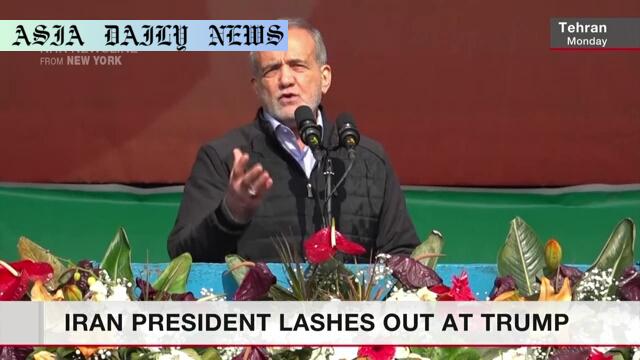Iran-US relations: Iranian President Masoud Pezeshkian criticizes US President Donald Trump for his contradictory negotiation tactics.
- Iranian President Masoud Pezeshkian criticized Donald Trump’s approach during a significant speech in Tehran.
- He pointed out contradictions in Trump’s negotiation tactics juxtaposed with sanctions and conspiracies.
- Pezeshkian shifted focus to US-Israel support, questioning who truly disrupts regional peace.
- His commentary reflects enduring tensions stemming from the US withdrawal from the nuclear deal.

Sharp Critique: Iran’s Leadership Challenges Trump’s Policies
Introduction: The 46th Anniversary of the Islamic Revolution
On the occasion of the 46th anniversary of the Islamic Revolution in Iran, President Masoud Pezeshkian delivered a powerful speech in Tehran reflecting on the trajectory of Iran-US relations. The Islamic Revolution of 1979 marked a pivotal moment in modern Middle Eastern history, bringing a pro-US monarchy to an end and establishing a theocratic republic. This context set the stage for the Iran-US opposition that continues to play a central role in geopolitical tensions today.
Pezeshkian’s Critique of Trump’s Policy
President Pezeshkian openly criticized US President Donald Trump for his contradictory approach to Iran. He accused Trump of advocating for diplomatic talks while simultaneously escalating economic and political pressure on Tehran. Pezeshkian highlighted what he described as “conspiracies” aimed at undermining the Islamic Revolution, emphasizing that such strategies have only deepened distrust between the two countries.
Pezeshkian underscored Trump’s role in disrupting previous agreements, particularly the 2015 nuclear deal, known as the Joint Comprehensive Plan of Action (JCPOA). The US withdrawal from the agreement in 2018 under Trump’s administration sent shockwaves across global forums, diminishing confidence in unilateral negotiations with the US.
Regional Disturbances: Blaming the US-Israel Alliance
In his address, Pezeshkian also pointed a finger at the US-Israel alliance, arguing that their actions are the primary cause of instability in the Middle East. He referred specifically to military operations in Gaza, Lebanon, and Syria, underscoring that ongoing regional violence cannot solely be attributed to Iranian influence. Instead, he argued that any constructive diplomacy must hold other powerful actors accountable for their actions.
Economic Fallout of Sanctions
The sanctions imposed on Iran during Trump’s presidency have had significant repercussions for Iran’s economy and its people. From limiting oil exports to targeting financial institutions, these measures have exacerbated economic hardships in Iran. Pezeshkian’s speech not only opposed these sanctions but also highlighted their role in undermining avenues for meaningful diplomacy.
The Fragile Path Forward
The speech portrays a growing sense of frustration within Iran regarding US policies. While Pezeshkian criticized the contradictions in Trump’s rhetoric and actions, he also offered subtle insight into the complexity of international relations in the region. Despite the expressed skepticism, the Iranian leadership appears keenly aware of the need for diplomatic solutions, albeit with guarantees and tangible steps toward building mutual trust.
Conclusion
Pezeshkian’s remarks underscore the enduring tensions between Iran and the US, as well as point toward larger dynamics at play in the Middle East. His critique of Trump sheds light on broader dissatisfaction with Western policies in the region, drawing attention to not only historical grievances but also to the immediate human and economic cost of sanctions and instability. As the situation unfolds, the path forward will likely require a recalibration of strategies on both sides if there is any hope for reducing hostilities and fostering stability.



Commentary
The Challenge of Trust in Diplomacy
The long-standing tension between Iran and the United States continues to defy resolution, and President Pezeshkian’s critique of President Trump’s policies provides yet another example of this complicated relationship. His observations highlight the challenge of negotiating trust when actions and rhetoric appear contradictory. For Iran, the unilateral withdrawal from the nuclear agreement seemed to confirm their suspicions about the reliability of US commitments. This distrust has served as a roadblock to any progress in reestablishing diplomatic ties.
Regional Balance of Power
Pezeshkian’s focus on the US-Israel alliance underscores one of the most contentious issues in Middle Eastern geopolitics. His speech echoes widespread criticism within the region about Western nations’ disproportionate support for Israel. From bombings in Gaza to actions in Lebanon and Syria, Iran’s leadership sees a pattern of unchecked aggression that they believe undermines peace initiatives. This perspective highlights the intricacies of alliances, where every action reverberates widely, influencing perceptions and strategies.
The Economic Dimension of Sanctions
Economic sanctions are a tool that has long been used to pressure Iran, but Pezeshkian’s remarks draw attention to their humanitarian consequences. Sanctions intended to weaken a regime often end up straining the livelihoods of ordinary citizens. This creates a paradox: policies designed to foster compliance can, in practice, entrench opposition by fueling resentment. Pezeshkian’s argument against these measures, though political, also raises valid concerns about the morality and effectiveness of economic pressure as a diplomatic strategy.
The Path Forward
As observers of global politics, it is clear that the issues between Iran and the US go beyond personalities like Pezeshkian or Trump. They are rooted in historical, ideological, and strategic factors. Yet, history has shown that no dispute is insurmountable if there is genuine commitment to finding solutions. Both sides must grapple with their own roles in perpetuating mistrust and systemic issues, addressing these with honesty if progress is to be achieved.